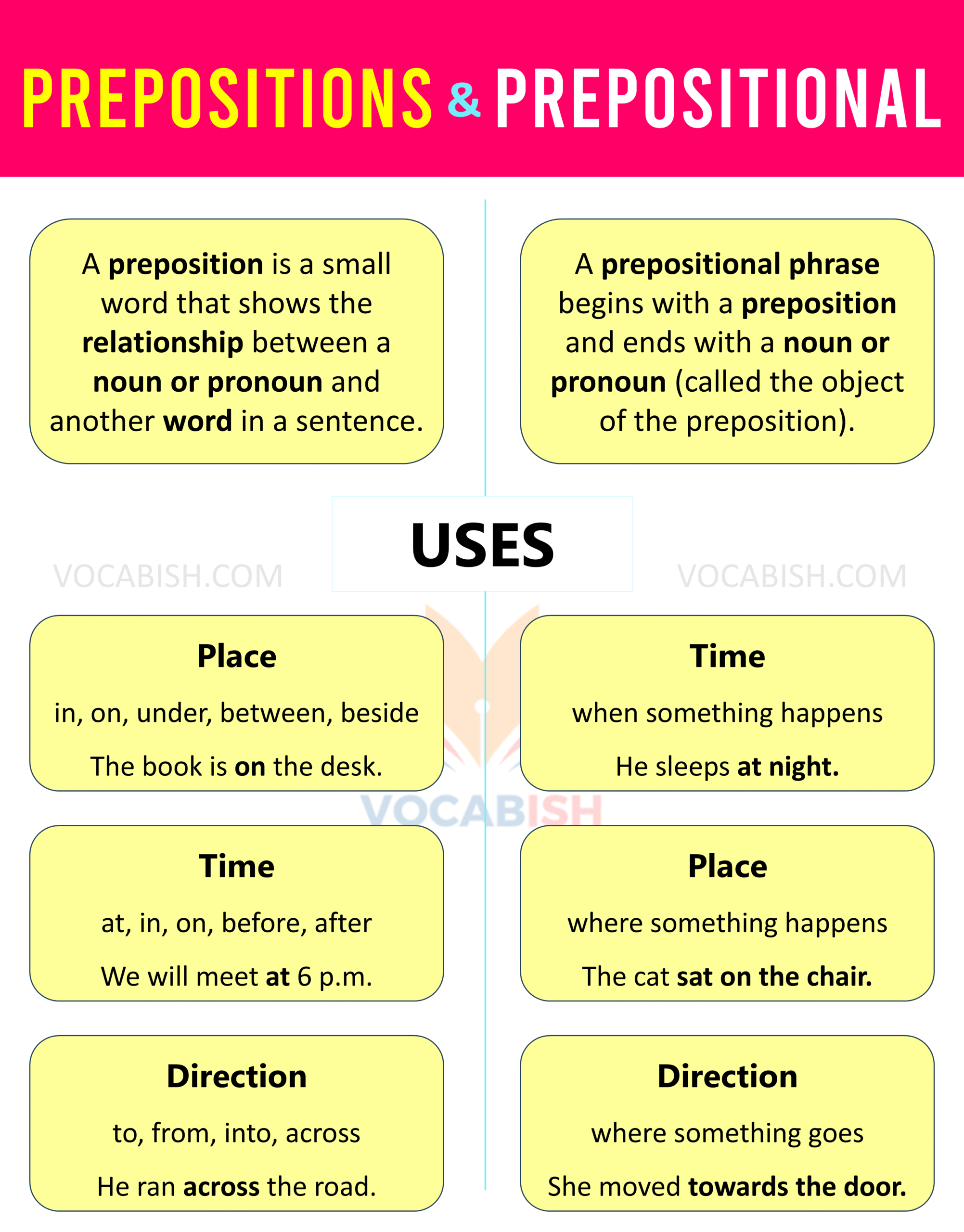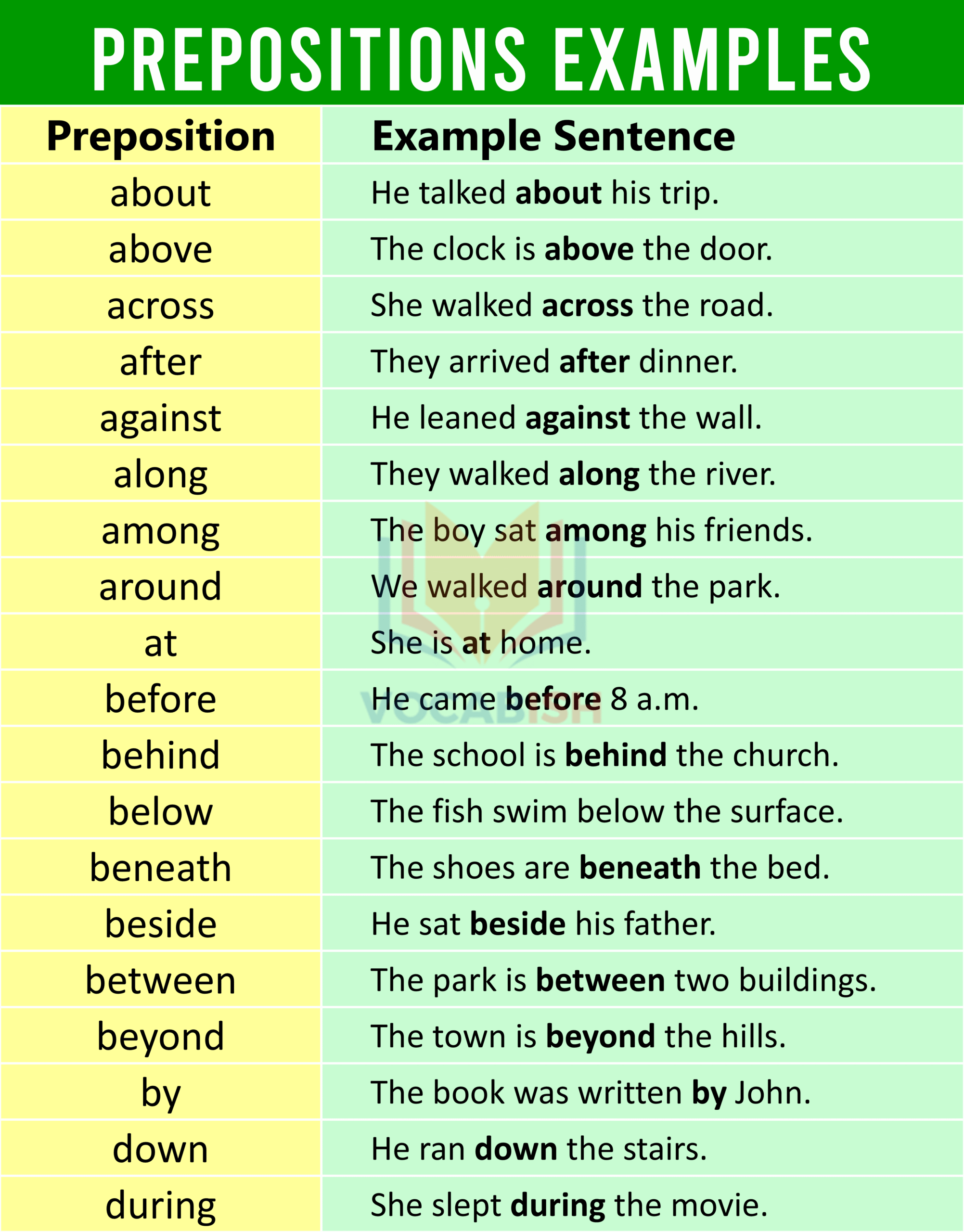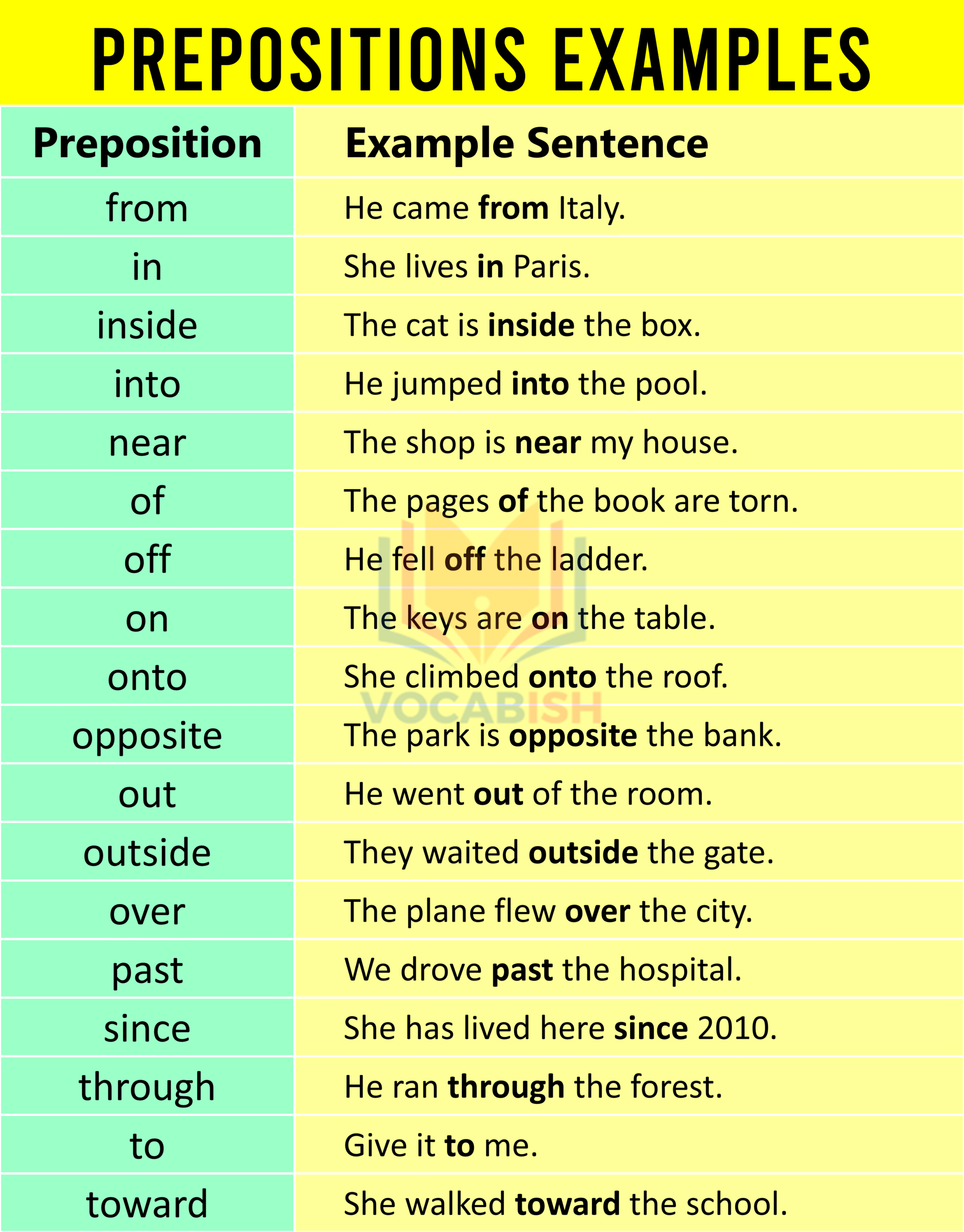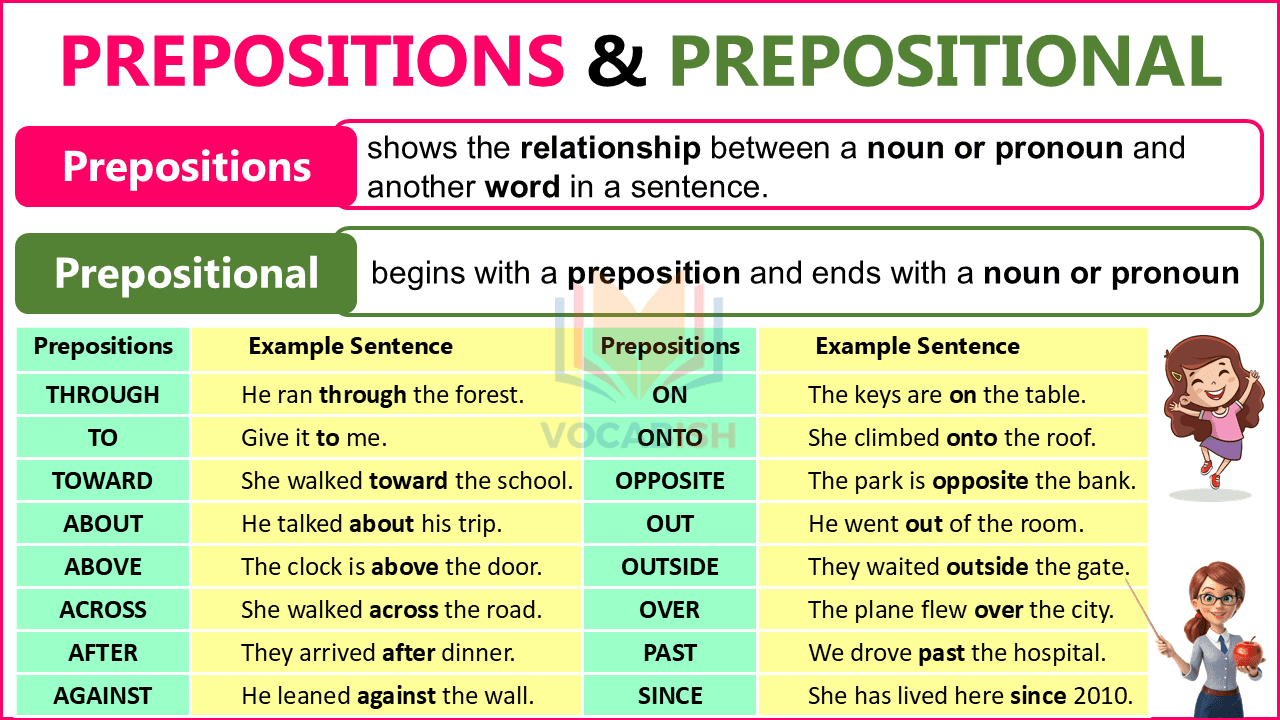Learning prepositions and prepositional phrases is an important step to improve your English grammar and writing skills. These small words help you show time, place, and direction. Understanding them makes your sentences clear, meaningful, and natural.
Let’s explore what prepositions and prepositional phrases are, with easy meanings, examples, and tables for quick understanding.
What is a Preposition?
A preposition is a small word that shows the relationship between a noun or pronoun and another word in a sentence.
Example:
- The cat is on the table.
- She walked to school.
Here, on and to are prepositions showing place and direction.
Usage of Prepositions
| Function | Example Prepositions | Example Sentence |
|---|---|---|
| Place | in, on, under, between, beside | The book is on the desk. |
| Time | at, in, on, before, after | We will meet at 6 p.m. |
| Direction | to, from, into, through, across | He ran across the road. |
| Reason/Purpose | for, because of, due to | She stayed home because of the rain. |
| Possession | of, with | The colour of the sky is blue. |
What is a Prepositional Phrase?
A prepositional phrase begins with a preposition and ends with a noun or pronoun (called the object of the preposition).
Examples:
- In the morning
- At the station
- Under the bed
- Across the river
Each phrase adds extra detail to the sentence.
Example Sentences:
- She goes jogging in the morning.
- The bag is under the table.
- We met at the bus stop.
How Prepositional Phrases Work
A prepositional phrase usually tells us about:
- Time → when something happens
- Place → where something happens
- Direction → where something goes
Examples:
- Time → He sleeps at night.
- Place → The cat sat on the chair.
- Direction → She moved towards the door.

List of 100 Prepositions with Examples
| Preposition | Example Sentence |
|---|---|
| about | He talked about his trip. |
| above | The clock is above the door. |
| across | She walked across the road. |
| after | They arrived after dinner. |
| against | He leaned against the wall. |
| along | They walked along the river. |
| among | The boy sat among his friends. |
| around | We walked around the park. |
| at | She is at home. |
| before | He came before 8 a.m. |
| behind | The school is behind the church. |
| below | The fish swim below the surface. |
| beneath | The shoes are beneath the bed. |
| beside | He sat beside his father. |
| between | The park is between two buildings. |
| beyond | The town is beyond the hills. |
| by | The book was written by John. |
| down | He ran down the stairs. |
| during | She slept during the movie. |
| except | Everyone came except Tom. |
| for | This gift is for you. |
| from | He came from Italy. |
| in | She lives in Paris. |
| inside | The cat is inside the box. |
| into | He jumped into the pool. |
| near | The shop is near my house. |
| of | The pages of the book are torn. |
| off | He fell off the ladder. |
| on | The keys are on the table. |
| onto | She climbed onto the roof. |
| opposite | The park is opposite the bank. |
| out | He went out of the room. |
| outside | They waited outside the gate. |
| over | The plane flew over the city. |
| past | We drove past the hospital. |
| since | She has lived here since 2010. |
| through | He ran through the forest. |
| to | Give it to me. |
| toward | She walked toward the school. |
| under | The cat is under the table. |
| until | Wait until I come back. |
| up | He climbed up the tree. |
| upon | Once upon a time, there was a king. |
| with | She goes with her brother. |
| within | Finish it within an hour. |
| without | He left without his bag. |

Prepositions List with Sentences
| Preposition | Example Sentence |
|---|---|
| aboard | He is aboard the ship. |
| along with | She came along with her mother. |
| apart from | Apart from English, he speaks Spanish. |
| as | He works as a teacher. |
| as far as | We walked as far as the bridge. |
| as well as | He sings as well as dances. |
| because of | The flight was delayed because of fog. |
| by means of | He travelled by means of train. |
| close to | The school is close to my house. |
| due to | The match was cancelled due to rain. |
| far from | His idea is far from perfect. |
| in addition to | In addition to tea, he drinks coffee. |
| in front of | The car is in front of the shop. |
| in place of | Use butter in place of oil. |
| in spite of | In spite of rain, we played. |
| instead of | We went by bus instead of train. |
| next to | The bank is next to the post office. |
| on behalf of | I spoke on behalf of the team. |
| on top of | There is a book on top of the shelf. |
| out of | He jumped out of the car. |
| prior to | Prior to joining, he worked at IBM. |
| relative to | The profit is small relative to cost. |
| regardless of | He came regardless of the weather. |
| thanks to | We succeeded thanks to your help. |
| together with | She arrived together with her friends. |
| up to | You can stay up to midnight. |
| according to | According to the report, it’s true. |
| apart from | Apart from the noise, the city is nice. |
| ahead of | She was ahead of everyone. |
| because | He was late because of traffic. |
| opposite to | The school is opposite to the library. |
| concerning | The teacher spoke concerning exams. |
| following | Following the rules is important. |
| per | You can buy two per person. |
| past | He ran past the shop. |
| via | We went via motorway. |
| unlike | Unlike her sister, she is shy. |
| upon | He stood upon the hill. |
| as per | Do it as per instructions. |
| ahead of | The car is ahead of us. |
| barring | Barring mistakes, it’s correct. |
| concerning | The news concerning jobs is good. |
| respecting | Respecting your opinion, I agree. |
| throughout | They travelled throughout the country. |
| underneath | The ball is underneath the chair. |
| amid | He sat amid the crowd. |
| following | Following the meeting, he left. |
| excluding | The total is £10, excluding tax. |
| including | The price is £12, including tax. |

Quick Review:
- Prepositions show relation between words.
- Prepositional Phrases give extra detail about time, place, or direction.
- Learning them helps make your English natural and fluent.
Frequently Asked Questions
What is the main purpose of prepositions?
Prepositions show the relationship between two words in a sentence.
Can a sentence end with a preposition?
Yes, in spoken English, it’s fine. Example: Who are you talking to?
Are all prepositional phrases the same?
No, they can show time, place, direction, or reason.
Why are prepositions difficult to learn?
Because one preposition can have different meanings in different contexts.
How can I master prepositions easily?
Read more English texts, notice how prepositions are used, and practice daily.

